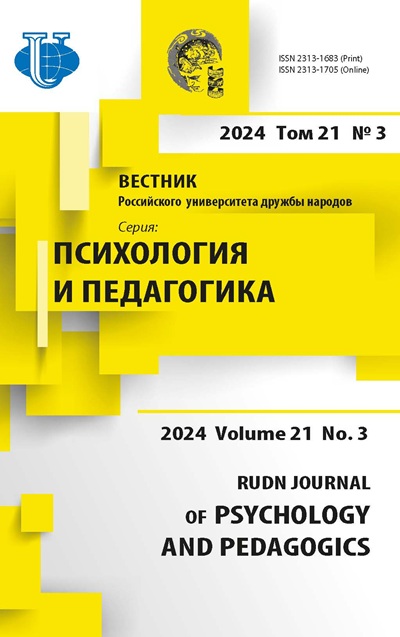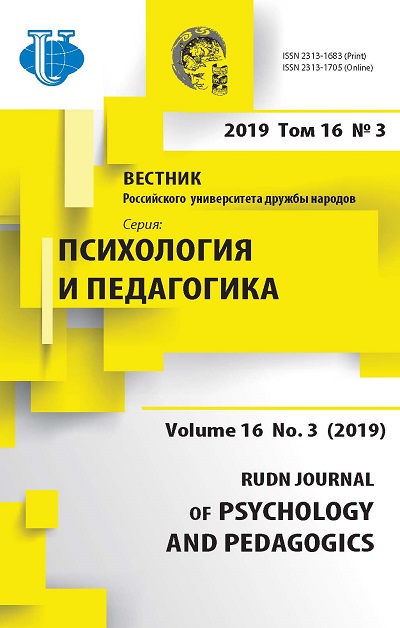Acculturation Scale to Russia (ASR) for International Students: Development and Psychometric Verification
- Authors: Ardila A.1,2, Maslova O.V1,3, Novikova I.A3, Shlyakhta D.A3, Aguilar Y.Y.3
-
Affiliations:
- I.M. Sechenov First Moscow State Medical University (Sechenov University)
- Florida International University
- Peoples’ Friendship University of Russia (RUDN University)
- Issue: Vol 16, No 3 (2019)
- Pages: 393-415
- Section: PSYCHODIAGNOSTICS
- URL: https://journals.rudn.ru/psychology-pedagogics/article/view/22137
- DOI: https://doi.org/10.22363/2313-1683-2019-16-3-393-415
Cite item
Full Text
Abstract
The growing number of migrants makes it relevant to study the problem of acculturation to a new culture and to develop adequate methodological tools for assessing acculturation. Acculturation scales are a common tool for studying the adaptation of international citizens; in Russia, however, there is a shortage of them. The purpose of this study was to develop a short, easy to use, and not requiring translation into the mother tongue scale, aimed at determining the level of acculturation. When developing the methodology, we relied on the analysis of the available acculturation scales and on the recommendations proposed by van de Vijver et al. This study included the following stages: development of the initial version of the scale, testing and analysis of comprehensibility of the scale questions, psychometric analysis, repeated testing and psychometric verification, and finally, determining external validity. At the various stages, the study covered 445 international students (42% female) from 71 countries. For psychometric analysis, descriptive statistics methods, Cronbach α and MacDonald ω coefficients, bifactor analysis were used. To check the external validity, the method of expert evaluations (16 experts are teachers of the Russian language, basic disciplines, tutors on educational work) and correlation analyses were used. As a result, the proposed Acculturation Scale to Russia (ASR) has a high consistency (α = 0,89, ω = 0,91), three-factor structure (3 subscales were identified), and its satisfactory external validity. This scale can be used to assess the level of acculturation of international students in Russia.
About the authors
Alfredo Ardila
I.M. Sechenov First Moscow State Medical University (Sechenov University); Florida International University
Author for correspondence.
Email: ardilaalfredo@gmail.com
Ph.D. in Psychology, is Full Professor, Professor at I.M. Sechenov First Moscow State Medical University (Sechenov University) and Florida International University
8 Trubetskaya St., bldg. 2, Moscow, 119991, Russian Federation; 11200 SW 8th St., Miami, Florida, 33199, The United States of AmericaOlga V Maslova
I.M. Sechenov First Moscow State Medical University (Sechenov University); Peoples’ Friendship University of Russia (RUDN University)
Email: maslova-ov@rudn.ru
Ph.D. in Psychology, is Associate Professor, Associate Professor at I. М. Sechenov First Moscow State Medical University (Sechenov University) and at the Social and Differential Psychology Department of Peoples’ Friendship University of Russia (RUDN University).
8 Trubetskaya St., bldg. 2, Moscow, 119991, Russian Federation; 6 Miklukho-Maklaya St., Moscow, 117198, Russian FederationIrina A Novikova
Peoples’ Friendship University of Russia (RUDN University)
Email: novikova-ia@rudn.ru
Ph.D. in Psychology, is Associate Professor, Associate Professor at the Social and Differential Psychology Department
6 Miklukho-Maklaya St., Moscow, 117198, Russian FederationDmitriy A Shlyakhta
Peoples’ Friendship University of Russia (RUDN University)
Email: shlyakhta-da@rudn.ru
Ph.D. in Psychology, is Associate Professor, Associate Professor at the Social and Differential Psychology Department
6 Miklukho-Maklaya St., Moscow, 117198, Russian FederationYussara Yussara Aguilar
Peoples’ Friendship University of Russia (RUDN University)
Email: 1032105851@rudn.ru
MA in Psychology, is Ph.D. student of the Social and Differential Psychology Department
6 Miklukho-Maklaya St., Moscow, 117198, Russian FederationReferences
- Arends-Tóth, J., & van de Vijver, F.J.R. (2006). Assessment of psychological acculturation. In D.L. Sam & J.W. Berry (Eds.), The Cambridge Handbook of Acculturation Psychology (pp. 142–160). New York, NY, US: Cambridge University Press.
- Barry, D.T. (2001). Development of a new scale for measuring acculturation: The East Asian Acculturation Measure (EAAM). Journal of Immigrant Health, 3(4), 193–197.
- Berry, J.W. (1997). Immigration, acculturation, and adaptation. Applied Psychology: An International Review, 46(1), 5–34. https://doi.org/10.1080/026999497378467
- Berry, J.W., & Sam, D. (1997). Acculturation and adaptation. In J.W. Berry, M.H. Seagull, & C. Kagitcibasi (Eds.), Handbook of Cross-Cultural Psychology: Social Behavior and Applications (vol. 3, pp. 291–326). Needham Heights, MA: Allyn & Bacon.
- Berry, J.W., Berry, J.W., Poortinga, Y.H., Segall, M.H., & Dasen, P.R. (2002). Cross-Cultural Psychology: Research and Applications. Cambridge University Press.
- Berry, J.W., Berry, J.W., Poortinga, Y.H., Segall, M.H., & Dasen, P.R. (2007). Cross-Cultural Psychology: Research and Applications. Kharkov: Humanitarian Center Publ. (In Russ.)
- Celano, M.P. & Tyler, F.B. (1991). Behavioral acculturation among Vietnamese refugees in the United States. Journal of Social Psychology, 131, 373–385.
- Chebotareva, E.J. (2011). Intercultural adaptation to Russia of students from Asia, Africa, Latin America and the Middle East. RUDN Journal of Psychology and Pedagogics, (3), 6–11.
- Chinakal, O.V., & Novikova, I.A. (2010). Ispol’zovanie protsedury dvoinogo perevoda dlya sozdaniya angloyazychnoi versii oprosnika ALKSS. Aktual’nye Problemy Etnopsikhologii: Conference Proceedings (pp. 228–234). Moscow: RUDN University Publ. (In Russ.)
- Cúellar, I., Harris, L.C. & Jasso, R. (1980). An acculturation scale for Mexican American normal and clinical populations. Hispanic Journal of Behavioral Sciences, (2), 199–217.
- Felix-Ortiz, M., Newcomb, M.D., & Myers, H. (1994). A multidimensional measure of cultural identity for Latino and Latina adolescents. Hispanic Journal of Behavioral Sciences, 16(2), 99–115.
- Gim Chung, R.H., Kim, B.S., & Abreu, J.M. (2004). Asian American multidimensional acculturation scale: development, factor analysis, reliability, and validity. Cultural Diversity and Ethnic Minority Psychology, 10(1), 66.
- Guan, Tszyuan, & Maslova, O.V. (2007). Dinamika mezhkul’turnoi adaptatsii kitaiskikh studentov. Lichnost’ v Sovremennom Obshchestve: Psikhologo-Pedagogicheskie i Ekologopsikhologicheskie Aspekty Formirovaniya i Razvitiya: Conference Proceedings (pp. 87–88). Moscow: RUDN University Publ. (In Russ.)
- Helms, J.E., & Parham, T.A. (1996). The racial identity attitude scale. Handbook of Tests and Measurements for Black Populations, 2, 167–174.
- Ho Vo Que, Chi, & Maslova, O.V. (2014). Osobennosti adaptatsii k novoi sotsiokul’turnoi srede v’etnamskikh studentov. Sotsial’no-Psikhologicheskaya Adaptatsiya Migrantov v Sovremennom Mire: Conference Proceedings (pp. 173–177). Moscow: Pero Publ. (In Russ.)
- Kim, M., Chen, J.L., Kools, S., & Weiss, S. (2016). The Impact of Personality Traits and Acculturation on the Mental Health of Korean American Adolescents. Psychology, 7(09), 1256–1265. https://doi.org/10.4236/psych.2016.79128
- Klain, P. (1994). Spravochnoe Rukovodstvo po Konstruirovaniyu Testov. Kiev: PAN Ltd Publ. (In Russ.)
- Klonoff, E.A., & Landrine, H. (2000). Revising and improving the African American acculturation scale. Journal of Black Psychology, 26(2), 235–261.
- Lebedeva, N.M., & Tatarko, A.N. (2009). Strategii Mezhkul’turnogo Vzaimodeistviya Migrantov i Naseleniya Rossii. Moscow: RUDN University Publ. (In Russ.)
- Marin, G., & Gamba, R.J. (1996). A new measurement of acculturation for Hispanics: The Bidimensional Acculturation Scale for Hispanics (BAS). Hispanic Journal of Behavioral Sciences, 18(3), 297–316.
- Marin, G., Sabogal, F., Marin, B.V., Otero-Sabogal, R., & Perez-Stable, E.J. (1987). Development of a short acculturation scale for Hispanics. Hispanic Journal of Behavioral Sciences, 9(2), 183–205.
- Maslova, O.V. (2007). Peculiarities of adaptation to a new sociocultural environment of students from Latin America and Angola. RUDN Journal of Psychology and Pedagogics, (2), 83–91. (In Russ.)
- Maslova, O.V. (2008a). Razlichiya v mezhkul’turnoi adaptatsii studentov iz Afriki, Latinskoi Ameriki i Kitaya. Teoreticheskie Problemy Etnicheskoi i Kross-Kul’turnoi Psikhologii: Conference Proceedings (pp. 399–405). Smolensk: Smolensk State University. (In Russ.)
- Maslova, O.V. (2008б). Sravnitel’nye kharakteristiki adaptatsii studentov iz Afriki, Latinskoi Ameriki i Kitaya. Lichnost’ v Mezhkul’turnom Prostranstve: Conference Proceedings(pp. 106–111). Moscow: RUDN University Publ. (In Russ.)
- Maslova, O.V., & Ho Vo Que, Chi (2014). Acculturation factors of Vietnamese students in Russia. Akmeology (S1–2), 149–151. (In Russ.)
- Maslova, O.V., & Kuyala Makera, G.E. (2008). Adaptatsiya k novoi sotsiokul’turnoi srede studentov iz Latinskoi Ameriki. Psikhologiya i Pedagogika v Innovatsionnykh Protsessakh Sovremennogo Meditsinskogo Obrazovaniya: Collection of Articles (pp. 154–158). Yaroslavl: Avers Plyus Publ. (In Russ.)
- Maslova, O.V., & Liu, Huihan. (2014). Acculturation styles and the adaptation level of Chinese students in Russia. Akmeology (S1–2), 148–149. (In Russ.)
- Maslova, O.V., & Tomas, K.D. (2016). Osobennosti mezhkul’turnoi adaptatsii afrikanskikh studentov v Rossii. Aktual’nye problemy sovremennykh gumanitarnykh nauk: Conference Proceedings (pp. 287–289). Moscow: RUDN University Publ. (In Russ.)
- Mills, S.D., Malcarne, V.L., Fox, R.S., & Sadler, G.R. (2014). Psychometric evaluation of the brief acculturation scale for Hispanics. Hispanic Journal of Behavioral Sciences, 36(2), 164–174. https://doi.org/10.1177/0739986314526697
- Mishra, R.C., Sinha, D. & Berry, J.W. (1996). Ecology, Acculturation and Psychological Adaptation: a Study of Adivasis in Bihar. Thousand Oaks, CA: Sage Publication.
- Norris, A.E., Ford, K., & Bova, C.A. (1996). Psychometrics of a brief acculturation scale for Hispanics in a probability sample of urban Hispanic adolescents and young adults. Hispanic Journal of Behavioral Sciences, 18(1), 29–38.
- Novikov, A.L., & Novikova, I.A. (2013). Social Representations of Russian Cuisine in Multinational University Students. Mediterranean Journal of Social Science, 4(11), 413–417. https://doi.org/10.5901/mjss.2013.v4n11p413
- Novikova, I.A. (2010). Relationship between the parameters of tolerance and cross-cultural adaptation of foreign students. RUDN Journal of Psychology and Pedagogics, (4), 24–28.
- Panov, M.S. (1999). Vliyanie Lichnostnykh Kharakteristik na Adaptatsiyu Bezhentsev: BA/MA Final Qualifying Work in Psychology. Moscow: Lomonosov Moscow State University. (In Russ.)
- Paulhus, D.L. (2013). Vancouver Index of Acculturation (VIA). Measurement Instrument. Database for the Social Science. Retrieved from www.midss.ie
- Pochebut, L.G. (2007). Vzaimoponimanie Kul’tur. Metodologiya i Metody Etnicheskoi i KrossKul’turnoi Psikhologii. Psikhologiya Mezhetnicheskoi Toleratnosti. Saint Petersburg: Saint Petersburg State University Publ.
- Ryder, A.G., Alden, L.E., & Paulhus, D.L. (2000). Is acculturation unidimensional or bidimensional? A head-to-head comparison in the prediction of personality, self-identity, and adjustment. Journal of Personality and Social Psychology, 79(1), 49.
- Sellers, R.M., Rowley, S.A., Chavous, T.M., Shelton, J.N., & Smith, M.A. (1997). Multidimensional Inventory of Black Identity: A preliminary investigation of reliability and constuct validity. Journal of Personality and Social Psychology, 73(4), 805.
- Snowden, L.R., & Hines, A.M. (1999). A scale to assess African American acculturation. Journal of Black Psychology, 25(1), 36–47.
- Stefanenko, T.G. (1996). Adaptatsiya k novoi kul’ture i puti ee optimizatsii. In Yu.M. Zhukov, L.A. Petrovskaya & O.V. Solov’eva (Eds.), Vvedenie v Prakticheskuyu Sotsial’nuyu Psikhologiyu (pp. 167–185). Moscow: Smysl Publ. (In Russ.).
- Stefanenko, T.G. (2014). Etnopsikhologiya. Moscow: Aspekt-Press Publ. (In Russ.)
- Stephenson, M. (2000). Development and validation of the Stephenson Multigroup Acculturation Scale (SMAS). Psychological Assessment, 12(1), 77.
- Suinn, R.M., Ahuna, С. & Khoo, G. (1992). The Suinn-Lew Asian self-identity acculturation scale: concurrent and factorial validation. Educational and Psychological Measurement, 52, 1041–1046.
- Szapocznik, J., Kurtines, W.M., & Fernandez, T. (1980). Bicultural involvement and adjustment in Hispanic-American youths. International Journal of Intercultural Relations, 4(3–4), 353–365.
- Tappen, R., Williams, C., Rosselli, M., & Jett, K. (2004, October). Development and testing of a new measure of acculturation and biculturalism. In National Congress on the State of the Science in Nursing Research, sponsored by The Council for the Advancement of Nursing Science, Washington, DC.
- Triandis, H.C., Kashima, E., Shimada, E., & Villareal, M. (1988). Acculturation indices as a means of confirming cultural differences. International Journal of Psychology, 21, 43–70.
- Ward, C. (2003). Alphabet of acculturation. In D. Matsumoto (Ed.), Psychology and Culture (pp. 656–709). Saint Petersburg: Piter Publ. (In Russ.)
- Ward, C., Bochner, S., & Furnham, A. (2001). The Psychology of Culture Shock (2nd ed.). New York, NY, US: Routledge.
- Worrell, F.C., Mendoza-Denton, R., Telesford, J., Simmons, C., & Martin, J.F. (2011). Cross Racial Identity Scale (CRIS) scores: Stability and relationships with psychological adjustment. Journal of Personality Assessment, 93(6), 637–648. https://doi.org/10.1080/00223891.2011.608762
- Yamada, A.M., Marsella, A.J., & Yamada, S.Y. (1998). The Development of the Ethnocultural Identity Behavioral Index: Psychometric Properties and Validation with Asian Americans and Pacific Islanders. Asian American and Pacific Islander Journal of Health, 6(1), 35–45.
- Zea, M.C., Asner-Self, K.K., Birman, D., & Buki, L.P. (2003). The Abbreviated Multidimentional Acculturation Scale: Empirical validation with two Latino/Latina samples. Cultural Diversity and Ethnic Minority Psychology, 9(2), 107. https://doi.org/10.1037/1099-9809.9.2.107
- Zhambal, O. (2017). Problemy perevoda metodiki ALKSS na mongol’skii yazyk. Sovremennye issledovaniya v psikhologii: Conference Proceedings (pp. 163–167). Moscow: RUDN University Publ. (In Russ.)
















